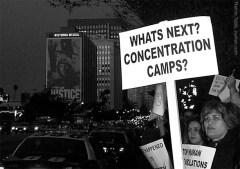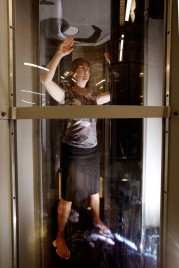In the U.S., Government wants to kill Fourth Amendment
November 26, 2010
Obama Administration working on legislation to hold suspects indefinitely without trial. Now we know what those ‘non-existent’ FEMA Camps are for.
NPR
It is starting to look like the president who campaigned on closing the prison at Guantanamo Bay may end up doing something wholly different: signing a law that would pave the way for terrorism suspects to be held indefinitely.
Administration officials are looking at the possibility at codifying detention without trial and are awaiting legislation that is supposed to come out of Congress early next year.
Analysts say two key events have conspired to force President Obama’s hand on indefinite detention legislation. Last week, a New York jury nearly acquitted Ahmed Ghailani, a young Tanzanian who was charged with more than 280 counts of murder and conspiracy for his alleged role in the 1998 embassy bombings in Africa; and Republicans regained control of the House of Representatives in midterm elections.
Case Highlights Administration’s Dilemma
Obama administration officials had thought the Ghailani case would be a slam-dunk. Four other men were convicted of the same crime in the same New York federal court back in 2002.
But in this case, after five days of deliberation the jury convicted Ghailani of a single charge of conspiracy.
“The jury came within one count of acquitting him entirely,” says Benjamin Wittes, a senior fellow at the Brookings Institution. “And had that happened that would have put the government in an enormously difficult position because if you hold a trial and somebody is acquitted, it kind of violates our sense of what a trial is to say, well, we’re going to hold him anyway.”
Ghailani was never going to walk out of the courtroom a free man because the Obama Justice Department, from Attorney General Eric Holder on down, has made clear that if any high-profile terrorism suspects are acquitted, they will never go free. They would be held as enemy combatants instead.
Juan Zarate, a former deputy national security adviser in the Bush administration and now a fellow at the Center for Strategic and International Studies, says that’s a huge problem. When prosecutors can hold someone behind bars even without proving their case the criminal trial becomes a show trial.
“When the attorney general is asked if Khalid Sheikh Mohammed [the alleged Sept. 11 mastermind] or, in this case, Ghailani is acquitted, and the answer for all intents and purposes is he’ll remain in custody regardless of the verdict, that is a problematic answer in the context of the use of the criminal legal system,” Zarate says.
“Heads I win, tails you lose, is not the way our justice system is supposed to work,” he adds.
Possible Alternatives
If holding someone indefinitely as a fallback position is a bad idea, there are only a couple of alternatives. One is to try suspects in a military commission — which operates under different rules of evidence, although analysts are quick to say that the evidence that was barred from the federal trial in the Ghailani case probably wouldn’t have been admissible in a military commission either.
Another option is to imprison terrorism suspects without ever going to trial — to just hold them.
And that’s what lawmakers are looking at now. In August, Republican Sen. Lindsey Graham of South Carolina quietly introduced a bill that would codify indefinite detention. He wanted to answer questions such as what kind of enemy combatant could be locked up without trial? How much evidence would government need to do that?
While the idea of holding suspects indefinitely without charge is against everything the American legal system stands for, it is happening already: Mohammed was captured in March 2003 and has been in Guantanamo Bay since September 2006.
What would be new are clear rules to govern the practice. Right now, the administration says that it can hold terrorism suspects under the laws of war, a principle that has been upheld by the courts. There is also some legal cover in the resolution Congress passed in the days after the Sept. 11 attacks that provides sweeping powers to the executive to keep America safe.
“We need a framework that is legal and defensible that balances the individuals’ rights with the right of the government to defend itself,” says Zarate. “The way the Obama administration has approached this has been less than clear. They have applied different legal frameworks for different problems and that has created confusion.”
Even if the Obama administration wanted to try low-level detainees in U.S. courts, it faces so much opposition from Congress it would be hard to do. And now, with the new Republican majority in the House, what was once very hard could become impossible.
That’s why analysts say that Obama, rather than close Guantanamo, will end up having to support a law that holds suspects indefinitely. As one administration official who is privy to the deliberations told NPR, “I can’t see a way around that outcome right now.”
Zarate says the mixed verdict in the Ghailani case shows that the administration needs to define detention better than it has. “The decision on signing legislation on indefinite detention may be crystallizing in certain ways, especially in the post-election environment,” he says. “They are going to begin to speak about it more publicly and more directly. I think in many ways they have already made this decision.”
Civil Liberties Groups Cry Foul
“It is un-American to hold people without charge or trial,” says Laura Murphy of the American Civil Liberties Union’s Washington office. “Codifying indefinite detention will end up legitimizing it.”
What, she asks, if the detainees suspected of terrorism are actually innocent? What kind of system would there be to determine that? Would there be any kind of judicial review? If this applies to terrorism now, she asks, how long before it applies to drug lords or human traffickers or organized crime?
Wittes of the Brookings Institution sees it differently. He says indefinite detention without rules, which essentially is what is happening now, should concern people more. Individual judges, U.S. attorneys and civil liberties lawyers are handling this on a case-by-case basis. And that is making the process murky.
“If your concern is not legitimizing it, lying about it is a very strange way to do that,” says Wittes. “And what we are doing is lying to ourselves about the detention which we engage in.”
Incoming House Judiciary Chairman Lamar Smith of Texas is working on a companion bill to Graham’s effort. His aides declined to provide any detail about legislation that is in the works.
And administration officials told NPR that they didn’t want to discuss the legislation before they actually see what’s in it.
What seems clear at this point, however, is that one of the things to come out of the new Congress is going to be something that deals squarely with detainee detention.

